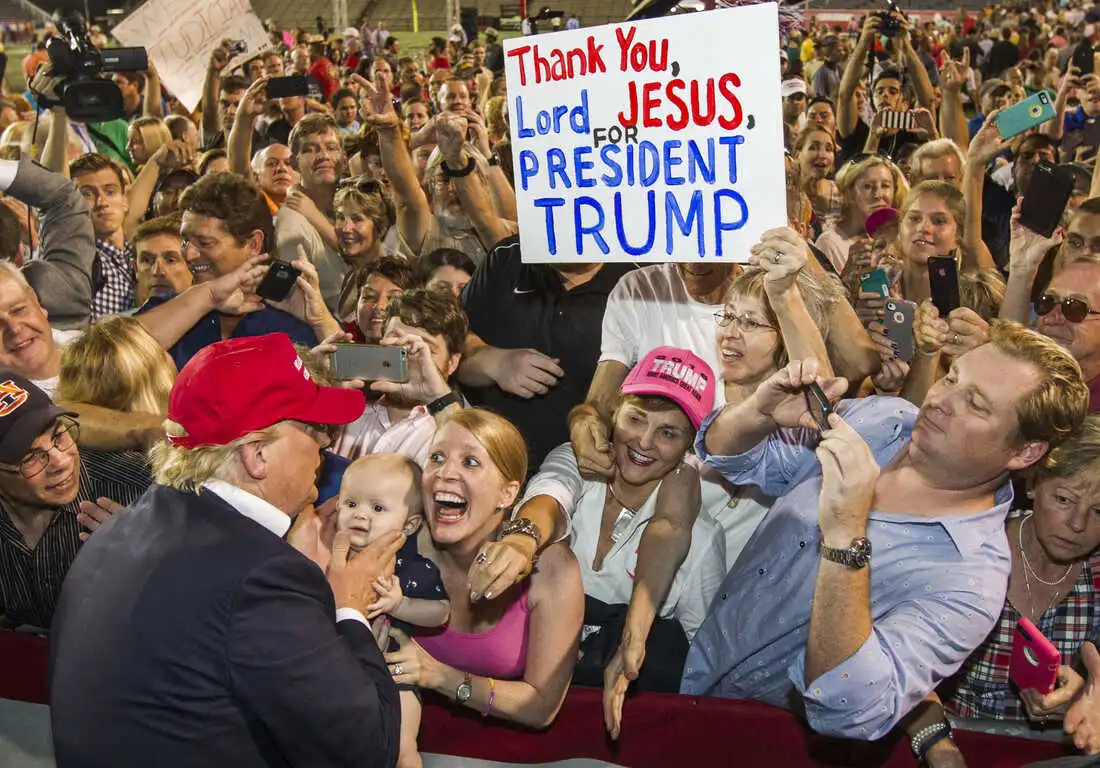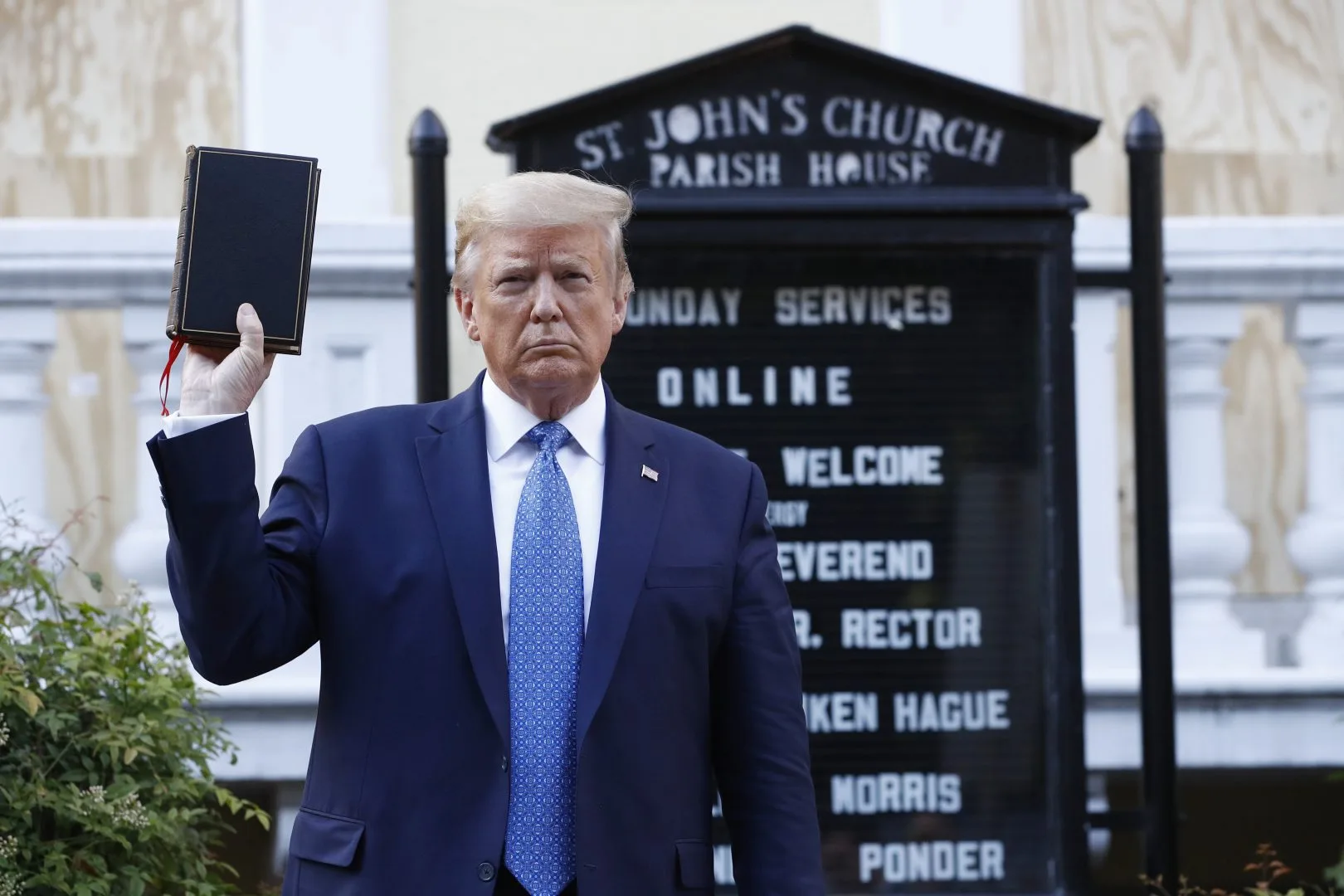Contents
- 1 Christian reactions to Trump’s Bible endorsement
- 2 Supportive responses from Christian leaders
- 3 Criticism from Christian leaders
- 4 Analysis of the controversy
- 5 Impact on Trump’s relationship with Christians voters
- 6 Lessons learned from the Bible endorsement controversy
- 7 The role of religion in politics
- 8 Conclusion
- 9 Author
The endorsement of President Donald Trump by prominent Christian leaders, who presented him with a symbolic Bible during a recent rally, has sparked both support and controversy. This gesture has become a focal point of discussion within the Christian community, with individuals from various denominations weighing in on the implications of intertwining faith with a political figure.
The endorsement took place during a rally where Christian leaders publicly expressed luna togel their support for Trump’s presidency. The symbolic presentation of a Bible was seen by many as a gesture of affirmation, signaling that Trump aligns with the values and beliefs held by Christians. This act was intended to demonstrate that Trump would protect religious freedoms and uphold Christian principles in his leadership.
However, the endorsement has not been without its critics. Some Christians argue that the intertwining of religion and politics can be problematic, as it blurs the line between the two spheres. They express concerns about the potential implications of aligning faith too closely with a particular political figure, fearing that it may compromise the integrity of their religious beliefs. This controversy has brought to light the diversity of perspectives within the Christian community on how faith should intersect with politics.

Christian reactions to Trump’s Bible endorsement
The endorsement of President Trump by Christian leaders has elicited a wide range of reactions within the Christian community. Supporters of the endorsement view it as a significant affirmation of Trump’s commitment to defending religious freedoms and upholding Christian values. They believe that Trump’s policies and actions align with their faith, and they see the endorsement as a testament to his dedication to advancing their cause.
On the other hand, critics argue that this endorsement blurs the line between religion and politics, potentially compromising the integrity of their faith. They express concerns that aligning too closely with a political figure may tarnish the reputation of Christianity and hinder its ability to effectively spread its message. They believe that Christians should prioritize their faith over political allegiances and advocate for issues that align with their religious beliefs, rather than aligning themselves with a particular political party or leader.
Supportive responses from Christian leaders
Many Christian leaders who endorsed Trump’s presidency have expressed their support for the Bible endorsement. They believe that it is important to publicly affirm a leader who they perceive as being aligned with Christian values. These leaders argue that Trump has demonstrated a commitment to protecting religious freedoms and has taken steps to advance policies that resonate with Christians. They view the endorsement as an opportunity to strengthen the relationship between the Christian community and the Trump administration.
These leaders also highlight the importance of engaging with political leaders and advocating for issues that align with Christian principles. They argue that Christians have a responsibility to make their voices heard in the political arena and should actively support leaders who champion their values. They see the endorsement as a way to encourage other Christians to engage in politics and ensure that their perspectives are represented in policy decisions.
Criticism from Christian leaders
While there are Christian leaders who support the Bible endorsement, there are also those who strongly criticize it. These leaders argue that the endorsement blurs the line between religion and politics, potentially compromising the integrity of their faith. They believe that aligning too closely with a political figure can tarnish the reputation of Christianity and hinder its ability to effectively spread its message.
Critics also express concerns about the implications of the endorsement on the Christian community’s relationship with the larger society. They worry that endorsing a political figure may alienate those who do not share the same political views, making it difficult to effectively engage in dialogue and bridge divides. They advocate for a more inclusive approach that focuses on promoting Christian values without aligning themselves too closely with a specific political figure or party.

Analysis of the controversy
The controversy surrounding Trump’s Bible endorsement highlights the complex relationship between religion and politics. It reveals the diverse perspectives within the Christian community on how faith should intersect with political leadership. The endorsement has become a focal point for discussions on the role of religion in politics, and the implications it may have on both the Christian community and the wider society.
One of the main points of contention is the potential compromise of religious integrity when aligning too closely with a political figure. Critics argue that endorsing a political leader may lead to a prioritization of political allegiances over religious beliefs, potentially diluting the message of Christianity. They emphasize the importance of maintaining a clear distinction between religion and politics, allowing Christians to advocate for their values without compromising their faith.
Supporters of the endorsement, however, argue that engaging with political leaders is crucial for advancing Christian values and protecting religious freedoms. They believe that aligning with a political figure who shares their values can empower Christians to influence policy decisions and promote positive change. They see the endorsement as an opportunity to strengthen the relationship between the Christian community and political leadership.
Impact on Trump’s relationship with Christians voters
The Bible endorsement has had a significant impact on Trump’s relationship with Christian voters. For those who support the endorsement, it serves as a reaffirmation of their belief that Trump is committed to protecting religious freedoms and advancing Christian values. They see the endorsement as a demonstration of Trump’s dedication to their cause and are likely to continue supporting him in future elections.
However, for those who criticize the endorsement, it may have had a negative impact on Trump’s relationship with Christian voters. They may view the endorsement as a blurring of the line between religion and politics, and question Trump’s commitment to upholding Christian principles. This could potentially lead to a loss of support from Christian voters who prioritize their faith over political allegiances.
The impact of the endorsement on Trump’s relationship with Christian voters will likely depend on the diversity of perspectives within the Christian community and the weight individuals place on the endorsement when considering their voting decisions. It remains to be seen how this controversy will shape future political dynamics and the role of religion in politics.
Lessons learned from the Bible endorsement controversy
The Bible endorsement controversy has highlighted several important lessons for both Christians and political leaders. First and foremost, it emphasizes the need for a thoughtful and nuanced approach to the intersection of religion and politics. It is crucial to consider the potential implications of aligning too closely with a political figure, and to prioritize the integrity of religious beliefs.
Secondly, the controversy underscores the importance of maintaining open and respectful dialogue within the Christian community. Recognizing and respecting diverse perspectives is essential for fostering understanding and unity, even when there are disagreements on how faith should intersect with politics. Engaging in constructive conversations can help Christians navigate the complexities of the relationship between religion and politics.
Lastly, the controversy serves as a reminder for political leaders to be mindful of the diverse religious beliefs within their constituencies. While seeking endorsements from religious leaders may be politically advantageous, it is important to consider the potential consequences and ensure that decisions are made with the best interests of all constituents in mind.

The role of religion in politics
The Bible endorsement controversy raises broader questions about the role of religion in politics. Religion has long played a significant role in shaping political beliefs and influencing policy decisions. However, the proper intersection of religion and politics remains a subject of debate and controversy.
Some argue that religion should play a prominent role in politics, as it provides a moral compass and a set of values that can guide policy decisions. They believe that religious perspectives should be taken into account when crafting legislation and that political leaders should actively engage with religious communities to understand their concerns and priorities.
Others, however, advocate for a clear separation of religion and politics. They argue that a secular government is essential for upholding the principles of religious freedom and ensuring that all citizens are treated equally, regardless of their religious beliefs. They believe that religious values should not be imposed on the wider society and that political decisions should be based on rationality and the common good.
The debate surrounding the role of religion in politics is complex and multifaceted. It raises important questions about the boundaries between the religious and the political spheres and the potential consequences of blurring those boundaries. Finding a balance that respects religious freedom while upholding democratic principles is a challenge that societies continue to grapple with.
Conclusion
The endorsement of President Donald Trump by prominent Christian leaders, symbolized by the presentation of a Bible during a rally, has ignited both support and controversy within the Christian community. Christians from various denominations have voiced their opinions on the implications of intertwining faith with a political figure, revealing a diversity of perspectives on how faith should intersect with politics.
The controversy surrounding the Bible endorsement has shed light on the complex relationship between religion and politics. Supporters of the endorsement argue that it affirms Trump’s commitment to protecting religious freedoms and advancing Christian values. Critics, however, express concerns about the potential compromise of religious integrity and the blurring of the line between religion and politics.
The impact of the endorsement on Trump’s relationship with Christian voters remains to be seen, as it has both strengthened support from some and raised doubts among others. Lessons learned from the controversy include the importance of thoughtful engagement with the intersection of religion and politics, the need for open and respectful dialogue within the Christian community, and the recognition of diverse religious beliefs within political decision-making.
If you found this article thought-provoking, we invite you to explore our piece on the rich history and culinary delights of Blue Cheese.


